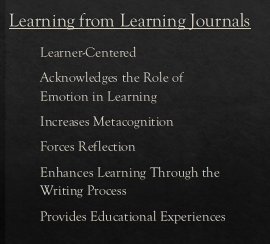Reflection and the process of keeping a learning journal is a huge time investment – for learner and instructor (for the instructor: depending on that assessment piece). It is also important to recognize the amount of time taken to invest in this learning takes away from other learning experiences and possibly other knowledge that may have been gained during the same time expenditure.
Despite these pieces of warning, recall that the learning gained through the learning journal and implementing the reflective practice have greater returns on investment than the passive learning that occurs within the classroom. (This is a good point to propose that maybe we’re simply trying to push too much information into our students in too small of a timeframe. Is it possible that we’re expecting too much? Is it time to step back and re-evaluate what knowledge is truly essential and then re-dedicate our educational pursuits to new ends?)
By using learning journals, instruction is student-centered and not teacher-centered. The student takes control. They have ownership. This ownership allows them to investigate the pieces that mean the most to them. They are encouraged to embed the new knowledge into their existing schemas. Connections that would not be made through teacher-centered approaches are more readily made through this freedom of learning through the reflective process. Learning become individualized, personal, vibrant, remembered and applied.
Acknowledges the Role of Emotion in Learning
Emotion is a vital in the learning process. Many individuals may not realize the importance of emotions in learning, but it is there and it is important to acknowledge them. It is interesting to note that feelings can be positive or negative toward learning. Think a moment on that one student or someone you know who walks into a learning situation with the preconceived opinion that they cannot learn or that they are not good at a particular topic. How does the effect the learning experience?
Learning journals can aid the student in not only recognizing these emotions but also in managing them. By checking in with one’s emotions, the learning process will be more successful.
Increases Metacognition
What is metacognition? It is simply the awareness of one’s thinking processes. Through the use of learning journals, individuals can better understand their thought processes. This in turn aids in the understanding of the best methods for learning to occur.
Forces Reflection
Writing and recording the learning experience will slow down the learning process. This also means that the learner is forced to slow down. More time for reflection and contemplation is permitted and even encouraged. There may even be opportunities for silence.
Enhances Learning Through the Writing Process
Learning is made more available through writing. Learners are encouraged to restructure information in a way that is of more valuable and personal to them. Have you ever sat in a lecture and simply felt that the information was not being presented in a logical manner? Learning journals promote the ability to rearrange the knowledge or information in a way that is of more value to them and arranged in a way that helps them to understand it.
Provides Educational Experiences
Simply stated, learning is enhanced and developed through the learning journal. Additional learning experiences are also identified. Through the reflective process, learners are encouraged to not only process what they have learned but also encouraged to question what they are learning. This may lead to more questions and further investigation into other topics. Greater connections are made.



Comments are closed